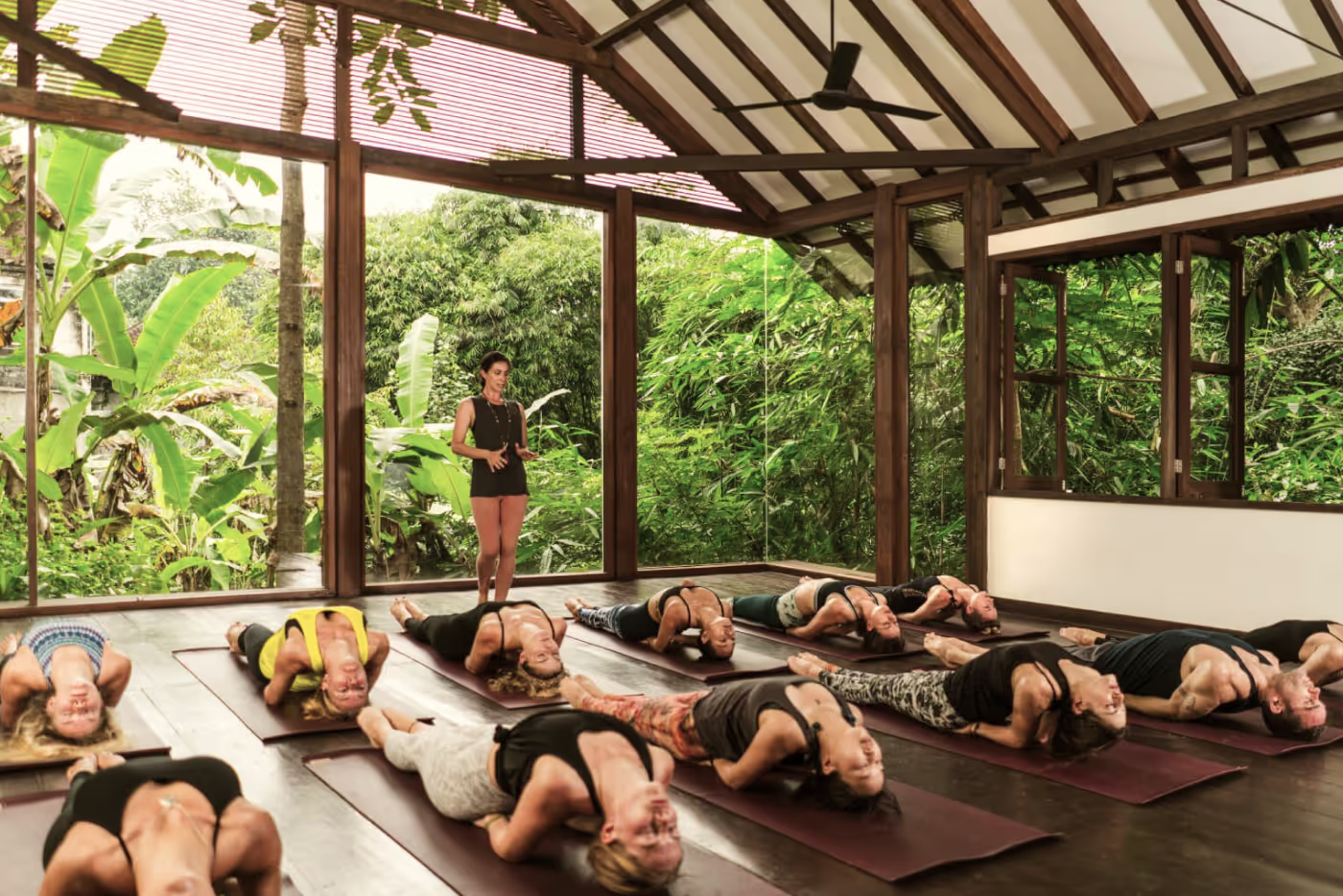Beyond the crowded Instagram hotspots lies Bali's authentic yoga soul. These five studios represent the island's most transformative spaces where ancient wisdom meets contemporary practice. Each offers something beyond the expected—architectural brilliance that harmonizes with nature, teachers whose lineages trace back generations, and approaches that honor yoga's spiritual essence while making it accessible to modern practitioners. These aren't merely places to perfect your asanas; they're sanctuaries where the island's unique energy facilitates deeper connection and personal evolution.

The Yoga Barn
Nestled in Ubud's verdant jungle landscape, The Yoga Barn has evolved from humble beginnings into a comprehensive wellness ecosystem without losing its soulful essence. What distinguishes this sprawling bamboo complex is its ability to honor traditional yogic teachings while embracing innovation. Their open-air studios—particularly the Forest Studio with its cathedral-like ceiling and jungle soundtrack—create an immersive practice environment unlike anywhere else on the island. Beyond the exceptional variety of classes (over 15 styles from Yin to Acro), it's the quality of international teachers and their commitment to authentic lineage-based instruction that elevates the experience. The community aspect flourishes through their Garden Kafe, where post-practice conversations often lead to meaningful connections and cultural exchange.

Radiantly Alive
While many Ubud studios court the Instagram crowd, Radiantly Alive cultivates something more substantial—a space where serious practitioners can deepen their practice through methodical, alignment-focused instruction. The studio's architectural brilliance lies in its minimalist design that maximizes natural light, creating practice spaces that shift in character throughout the day as sunlight filters through bamboo slats. Their signature Radiantly Alive Method merges precise alignment principles with breath-centered movement, offering a slower-paced but intensely challenging approach that transforms physical practice into moving meditation. What's particularly refreshing is their commitment to small class sizes and hands-on adjustments—increasingly rare in Bali's commercialized yoga scene. Their teacher training programs attract serious students looking to understand the philosophical underpinnings of yoga beyond performative asana.

Desa Seni
Desa Seni defies easy categorization—part yoga sanctuary, part living museum of Indonesian heritage, part eco-conscious retreat center. Set within a meticulously curated village of antique wooden homes transported from across the archipelago, the studio spaces themselves are architectural treasures where carved teak and ceremonial artifacts create a palpable connection to Indonesia's spiritual traditions. The teaching approach here honors yoga's roots while making it accessible to all levels, with particular attention to philosophical elements often overlooked elsewhere. Their commitment to sustainability extends beyond buzzwords—the organic gardens supply their excellent restaurant, and their water conservation systems should be a model for Bali's hospitality industry. What truly distinguishes Desa Seni is how seamlessly yoga integrates with cultural immersion through regular offerings of gamelan and dance alongside asana practices.

Samadi Bali
Samadi represents Canggu's mature evolution—a thoughtful antidote to the area's increasingly scene-driven yoga culture. The sunlit circular shala, with its striking sacred geometry-inspired design elements, creates a uniquely focused practice environment that draws serious practitioners seeking substance over spectacle. Their teaching methodology stands out for its scholarly approach to yoga philosophy, with regular dharma talks and Sanskrit study complementing physical practice. Samadi's Sunday organic market has become a community institution, but unlike other commercial ventures masquerading as 'conscious markets,' it maintains authentic connections with local farmers and artisans. Their Mysore Ashtanga program—Canggu's most respected—preserves the traditional self-practice approach increasingly diluted elsewhere on the island.

Morning Light Yoga
Hidden in Uluwatu's dramatic limestone landscape, Morning Light represents the evolution of Bali's yoga culture—sophisticated yet unpretentious, architecturally stunning yet environmentally integrated. The open-sided clifftop shala offers 180-degree ocean views that transform sunrise practices into transcendent experiences as dawn breaks over the Indian Ocean. What sets their teaching approach apart is the refreshing focus on breathwork and meditation alongside asana—elements often reduced to afterthoughts in Bali's more commercial studios. Their curated workshop series brings visiting masters teaching lesser-known practices like Katonah Yoga and somatic methodologies that challenge even experienced practitioners. The small class sizes foster genuine community, while their commitment to employing local staff at fair wages (rather than relying exclusively on foreign teachers) demonstrates a more thoughtful approach to cultural exchange.





